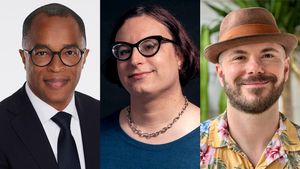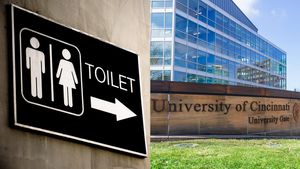
They’re field hockey players and aspiring journalists; they’re public speakers and published authors. And their existence has become a right-wing political punching bag — 24 states have banned them from receiving gender-affirming care. But the trans youth fighting to change narratives about their lives want you to know one important thing: they’re just kids.
Keep up with the latest in LGBTQ+ news and politics. Sign up for The Advocate's email newsletter.
When Jen Grosshandler’s daughter, Chazzie, came out as trans, she and her husband wanted to do everything in their power to support their child and others like her. But they were disheartened when they “could not find relatable, human, positivity-forward stories about who these young people were,” says Grosshandler.
This led to them asking: “How can we help the country see what we see every single day?” Together with their friend Gearah Goldstein, the Grosshandlers founded GenderCool Project, a coalition of families with trans children reclaiming the narrative by correcting misinformation and showcasing just how joyful and successful trans lives can be.
The public engagement campaign is represented by dozens of “Champions” – trans youth belonging to the next generation of leaders – who are proving that the future is already here, and it’s bright.
“These young people are having such a consequential, positive impact on how the country and the world actually understands and appreciates that transgender and nonbinary kids are just like all other kids,” Grosshandler says. “‘If you got to do what I do, if you got to spend your days in the presence of these young people, you would feel so positive, so optimistic, so empowered.”
Scroll on to meet a few of GenderCool Project's inspiring young Champions.
ASHTON (he/him)

courtesy GenderCool Project
When Ashton came out at the age of 12, there “weren't too many resources out there accessible to a kid, especially someone who wasn't on social media or the Internet.” Before he found the word “transgender,” he would search phrases such as “girl who feels like boy” or “stuck in the wrong body.”
“It wasn't necessarily something that I grew up being aware of. I just grew up feeling different than my peers and feeling like I didn't fit the mold I was supposed to,” Ashton says.
Growing up with Christian teachings and parents from the Dominican Republic, Ashton also says that he often reflects on whether his discomfort with his gender growing up was linked “to the fact that I was a person of color, usually in predominantly white schools and spaces, and feeling othered.” But he never let the discomfort define him, and wants others in his communities to know they, too, are limitless.
“Just because you are a person of color, have these differences, and you have an intersectional identity, doesn't mean that you can't live your life authentically like everyone else,” Ashton says.
After joining the Human Rights Campaign as a Youth Ambassador, and even introducing President Joe Biden at a White House Pride event, the 20-year-old now attends Yale, where he studies Political Science with a concentration in Political Psychology. He’s learned that he’s “passionate about storytelling” and would like to continue doing it “in whatever capacity that may be.” One of the ways he’s pursued this is through his co-authorship of A Kids Book About Being Inclusive.
“At the end of the day, that's what it's all about: inclusivity. Whether it's for gender identity, sexuality, religious differences, whatever it may be,” Ashton says, adding, “I see my advocacy not necessarily just for the LGBTQ community, but a bigger initiative of young people who are passionate about creating change in the world.”
REBEKAH (she/her)

courtesy GenderCool Project
Rebekah has a passion for writing and sharing her experiences, which is why the co-author of A Kids Book About Being Inclusive says the project was “based on our own personal stories.” The goal was to explain inclusivity by “putting it down to tiny examples that kids could understand.”
Though writing isn’t the 17-year-old’s only interest – she’s also a field hockey player for her school, which has embraced her talents.
“The only trouble that I faced has been within myself,” Rebekah says. “New Jersey has some really awesome policies around trans kids in school, but especially in sports. I have been really lucky with my coaches being willing to work with me, understand my story, and allow me to play as just a kid. … My peers are some of the biggest supporters that I have.”
Rebekah is thinking about pursuing political science when she attends college to continue her advocacy work. While she doesn’t have a specific school chosen, she’s “looking northeast because of safeties” — their pro-LGBTQ+ laws.
“It's been really interesting to see how my peers go about this college finding process, because they don't really have to think about their safety as much,” Rebekah says.
She wants to emphasize that “there’s no one size fits all” when it comes to trans youth, which is something she wishes the adults talking about them understood.
“We're thriving in our communities. I think so much of the narrative isn't around that,” Rebekah says. “We don't think about being trans every second of every day. We don't think about being LGBTQ every single second. We're just kids, and we just want to have fun. We want to play on our sports teams. We want to get involved with school activities.”
“Trans kids want to play sports for the fun of it, just like every other kid on the team,” she adds.
ADELYN (she/her/ella)

Though only 16, Adelyn is currently dual-enrolled in community college classes on a pre-law track. The high school student eventually wants to focus on civil rights law, which she was drawn to by all the “social injustices going on” around her.
“In my community, not only as a trans person, not only part of the LGBTQ community, but also here where I live so close to the border, I see injustices being made towards immigrants,” Adelyn says.
Adelyn’s home state of Texas has passed some of the harshest anti-LGBTQ+ laws in the nation. While the “hormone ban has gotten us pretty bad,” she says she hasn’t “gotten the rough end of the stick,” though moving “did cross our minds” when the laws were first enacted.
When she was younger, Adelyn gave a speech at the Texas legislature in defense of trans youth. The intimidating task didn’t phase her even then, as she says it was “a very easy thing for me to do.”
“I have a voice, and I get to defend myself in front of whoever it is because my parents taught me to stand up for myself,” Adelyn says.
Adelyn doesn’t give speeches anymore out of concern for her safety, but she believes even more strongly today that being trans isn’t “what most people would think it is,” explaining, “I live a pretty normal life.” If she could speak to her lawmakers now, she would tell them again to get their priorities in line.
“There are so many more issues going on in Texas, so many other things that need our legislators’ focus,” Adelyn says. “Re-address your focus to the issues that are actually affecting Texans day-to-day. Don't target us for your gain.”
DANIEL (he/him)

Daniel has been in tune with his identity since childhood, and was even featured in the PBS documentary Growing Up Trans at age 9. He knew early on that he wanted to cut his hair and wear boy’s clothes, which his parents were “extremely supportive of.”
“At that age, I didn't really even have words for what it was I was going through. I just knew that I didn't feel right living as a girl,” he said. “And my parents, with their support, I was able to really become who I was meant to be.”
Now 19, Daniel is a student at University of Connecticut majoring in Human Rights and Women’s, Gender, and Sexuality Studies. He is an honors diversity, equity, and inclusion (DEI) student specialist, helping to give students the foundation to “understand one another, understand how intersectionality plays into our lives, and how biases may play into our lives and our understandings of others.”
“In my college experience so far, I've really seen a lack of understanding,” Daniel says. “People just come from so many different backgrounds, and then they're thrown into college, and it's so much more diverse than it may have been in their high schools or their hometowns.”
“I don't feel like our schools are doing enough to educate people about these topics, so that's really what I've been trying to do,” he adds.
Daniel wants to someday work with companies on DEI efforts, possibly in consulting. He hopes that the work will help others to “have conversations, have discourse, be open to new ideas, opinions, and perspectives, because I feel like that's really what is lacking right now.” And the first step to understanding, he says, is knowing, which is why it’s important to know the truth about trans youth.
“I'm so much more than my transgender identity. I love to go to paint club, I love to go to the gym on campus,” Daniel says. “Being trans is just a tiny part of me. It's impacted me so much, but I'm so much more than that.”
CHAZZIE (she/her)

The importance of being the “voice for people who feel like they don't have a voice” isn’t lost on Chazzie, the inspiration behind and face of GCP. After socially transitioning at the age of 9, she says “it makes me really happy that I'm able to be who I am at only 18 years old.”
Chazzie helped found her high school’s broadcasting club, where she gave reports in both English and Spanish. She’ll be attending the University of Arizona in the fall for broadcast journalism, shooting for a career on camera.
“I hope to be one of the first transgender on-air news anchors of my generation, because there isn't a whole lot of representation of that now,” Chazzie says. “There's a lot of people behind the camera, but not in front of the camera. And I'm the kind of person who wants to put herself out there.”
The young reporter has done just that, with stories about her life being featured in several national outlets and even garnering her a GLAAD media award. Chazzie was also “very fortunate” to speak alongside other families of trans youth on Transgender Day of Visibility 2022 at the White House, where she “hope[s] to be back soon.” The message she would send to officials is simple.
“I am more than just a label. I am human. And seeing these high people of power use their voice to knock us down and pin this little label on to define us is really upsetting,” Chazzie says. “I really want people to realize that at the end of the day, I am just a teenage girl. I'm a daughter, I'm a sister, I'm a friend. And there's so much more about me than a little label.”

GenderCool Champions (left to right) Sivan, Daniel, Kai, Ashton, Gia, Chazzie, and Hayden at the 2022 GLAAD Media Awards.




























































































Did 'The White Lotus' waste Lisa's acting debut?